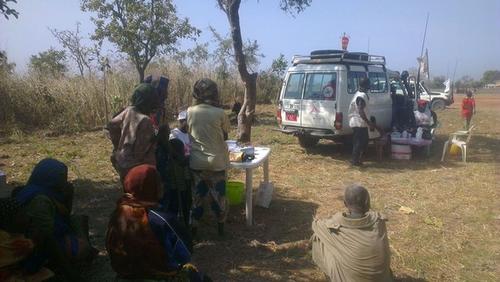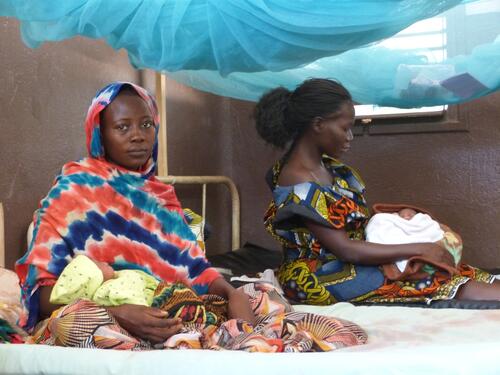Bangui, 24 December 2012 - Fighting and violence continued over the past week in several areas in the north and centre of Central African Republic (CAR). Increased military movements and hostilities between rebels and the army have forced civilian population to leave their homes, preventing them from accessing the basic services they need, in particular medical aid. This may have fatal consequences on a population already shattered by a decade of chronic armed violence and lack of healthcare system.
After hostilities broke out near the towns of Kaga Bandoro and Mbrès last Sunday, an emergency surgical team from Médecins Sans Frontières (MSF) tended to five wounded patients and is ready to treat more patients.
A team was also sent over the weekend to assess the potential medical needs around the town of Sibut, in the south centre part of CAR. The heavy presence of military in the area and the population’s fear of hostilities have also led to preventative displacement. MSF has donated drugs to the hospital of Sibut to help them respond to an increased number of patients.
In the town of Batangafo, occupied by the rebellion since 20 December, the population is terrified of the potential fighting that could occur. Insecurity has increased in the area, limiting access to medical aid for the population.
“Because of the insecurity in the area, it is impossible to refer any patient from the peripheral health posts to the hospital in case of severe conditions and emergencies due to the total restriction of moto-taxi movements,” says Amal El Oualji, project coordinator of MSF in Batangafo. MSF is still running its services at the hospital and giving support to the health post around the area as much as the security situation allows it. Last Sunday four patients were treated for gunshot wounds at the hospital.
In the town of Ndélé, in the north of CAR, which was attacked on 10 December, the situation is still very difficult for the population. Although some people have returned to the town, insecurity is still dissuading many others from doing likewise. Continuous lootings, coupled with sporadic gunshots at night, are preventing the population from returning to their daily lives in Ndélé. MSF is aware of at least 2,600 displaced people who are spending nights in small groups, hiding in the bush or seeking refuge at the airstrip, not far from town. Unfortunately, this is only a small fraction of the displaced population, most are spending the nights close to their crop fields in smaller groups of between two and five families spread over many kilometres, with no road access. Many of them suffer from diseases such as malaria, acute respiratory infection or diarrhoea. The MSF team in Ndélé continues to operate mobile clinic service to the airstrip and other regular activities at the hospital.
MSF is running three regular projects in Ndélé, Kabo and Batangafo and one emergency surgical intervention in Kaga Bandoro, all of them affected by the conflict. The medical humanitarian organisation is currently setting up an emergency team to respond to the increased needs of the civilian population.
MSF has been working in the CAR since 1997 and operates seven programmes in five of the country’s seven health districts. In collaboration with the Ministry of Health, MSF supports seven hospitals and about 38 health posts, and activities range from basic healthcare, to HIV and TB care, neglected diseases, nutrition programmes, vaccination, surgery and other specialist healthcare. Malaria is often the main focus of MSF’s programmes.





